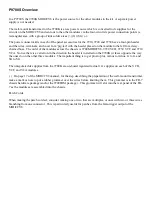
12
Reassembling the GPIB-232CT-A (DC Version)
This section describes how to reassemble the DC version of the GPIB-232CT-A.
Refer to Figure 6 and complete the following steps to reassemble the DC version
of the GPIB-232CT-A.
1.
Align the printed wiring board (H) on the lower assembly standoffs (N).
Check that the wires that connect the printed wiring board (H) to the DC
power jack (R) and the transistor (S) are inside the box and are not being
pinched.
2.
Insert the four screws (G) to secure the printed wiring board (H) to the lower
assembly (M). Tighten the screws.
3.
Gently press the metal cover (F) back onto the lower assembly (M) and
ensure that the metal cover (F) is positioned so that the tops of the light-
emitting diodes (J) are flush with the top of the GPIB-232CT-A.
4.
Place one washer (E) on one jackscrew (D) and insert the jackscrew (D) into
the mounting holes on the 9-Pin D-Sub serial connector (L) and tighten using
a 3/16 in. nutdriver or pliers. Repeat with the other washer (E) and
jackscrew (D).
5.
Place one lock washer (B) on one jackscrew (A). Hold the GPIB connector
shield (C) on the GPIB connector (I) and insert the jackscrew (A) through the
GPIB connector shield (C). Tighten using a 1/4 in. nutdriver or pliers.
Repeat with the other lock washer (B) and jackscrew (A).
































